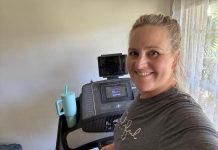Have you ever had the darnedest time answering a simple question?
We were at our last duty station for an unusually long time (a feat that requires good luck and some finagling to achieve) and would often be asked enthusiastically, “Aren’t you having just the best time here?”
I would respond like a deer in the headlights. It was indeed a lovely place to live but in that place, life was very hard and very heavy for almost three years. Three years which included disabling chronic illness and the loss of two children through miscarriage.
Although I could not answer the simple question easily back then, I hope that sharing about my experience now will help those directly and indirectly affected by loss through miscarriage. It is a quiet, common, and devastating life event whose heaviness is made a little lighter when the burden is shared.
 I like to think of military life as like “regular life”, but intensified. The servicemember’s employer owns not just his work life, but his life-life; the chaos of moving is tripled by changing countries instead of just houses; friend-hunting can be complicated by all kinds of things including decades of etiquette that no one’s quite sure if we’re still using.
I like to think of military life as like “regular life”, but intensified. The servicemember’s employer owns not just his work life, but his life-life; the chaos of moving is tripled by changing countries instead of just houses; friend-hunting can be complicated by all kinds of things including decades of etiquette that no one’s quite sure if we’re still using.
Miscarrying while overseas could be described the same way.
Ultrasounds were performed by the doctor at every appointment. With both pregnancies, I heard and watched their heartbeats, precious galloping flashes of light, several times. When the first loss was discovered, the confusion of “what do we do now?” was intensified by being treated in a hospital where I only spoke a few words of the language. The local medical treatment for miscarriage at this stage involved labor and delivering the baby rather than a quick procedure under anesthesia. Communication with the funeral home was in French and broken English. There were no support groups. Family and long-term friends, of course, were oceans away.
But in another way, miscarriage overseas is not much different at all.
Many people stateside live nowhere near their extended families; many people don’t have close friends nearby or at all. Hospitals and medical procedures are confusing and scary for everyone everywhere. There are no local support groups available to many Americans.
Whether abroad or at home, you still encounter reminders all the time of the baby who was and yet wasn’t to be. And grief crosses language and cultural barriers easily. The process was essentially the same when telling my military friends, my English-speaking friends, and my non-English speaking friends: awkward fumbling for words, a moment of understanding, hugs, tears, and sometimes the sharing of their own losses.
In the years before mine, I had several friends who experienced pregnancy loss while far from home, and I did not know how to support them. I used all the usual excuses for turning away. But now I know how much the smallest and most imperfect gesture makes a difference. Sometimes a family just needs someone to acknowledge their loss, to be there with them in it for more than a second.
The strange and wonderful thing about living overseas is that you might be called to that depth of friendship before you would have considered yourself close friends.
No gesture was too small to mean something to us. And the bolder things—questions asked, remembrance gifts given, solidarity offered to my husband—were comforting and welcome. If you know someone experiencing miscarriage overseas, understand that grief can trap a person in inertia, and your lifeline may be his or her only one. Don’t be afraid to step into the darkness and scrabble awkwardly around for your friend’s hand to hold. You might be able to walk with her back towards the light, or your role might just be to sit with her in the dark for a while. There are some messes that only God can clean up.
For you, my brave sisters, who have lost a little one this way:
I am sorry for the stilling of that sweet little heartbeat.
I am sorry for the lost future with your child.
I’m sorry that you had to tell your other children or the defeat you might feel in ever having any.
I am sorry for your pain and complicated emotions, for your loneliness. I know that you wish that support would find you, but I hate to say that you will probably have to go find it.

For me, a big part of healing was continuing attendance at our local chapel and letting them know what was going on (both our Sunday service and the women’s group—many chapels have at least two of the latter). You can also meet with your local Family Life Chaplain, who is also trained in counseling from a non-religious standpoint. You can try the Military and Family Life Counselor at your local Army Community Services building, or you can call your local behavioral health section and talk to a professional there or get referred out to a civilian provider. You might just grab the next person who asks “How are you?” Go out on a limb, and tell her the truth. Maybe nobody knew you were pregnant; tell someone. Share your baby’s name. The internet can provide a community to people in our shoes, but do not, do not keep your loss a secret in your embodied life. Nothing can replace having a shoulder to cry on.
Life, wherever we live, is confusing and strange and surprising.
We end up with gifts we never would have anticipated, and we lose ones we thought were guaranteed. As someone who’s moved around for her entire life, four and a half years in Belgium felt like forever. I lived lifetimes in that strange land of new life and loss which engraved on my heart designs that feel old and new and specific and universal all at once. I learned to grieve with hope while healing with scars that aren’t contained by a place but are inextricably tied to it.
So, didn’t I have just the best time there? It is okay that a simple answer is insufficient. The answer I can give is that in that place, I came across deeper pain, more surprising grace, sharper truths, and brighter hope than I would ever have looked for.
 Martha Hepler is a third-generation Army wife who has been traveling the globe since childhood. She currently spends her days homeschooling her kids and Instagramming sheep in East Northamptonshire, U.K. In their free time, she and her husband do complicated calculations to work out how much furniture they’ll have to get rid of in order to ship their library home. You can follow her on Instagram at @martha_hepler_photo.
Martha Hepler is a third-generation Army wife who has been traveling the globe since childhood. She currently spends her days homeschooling her kids and Instagramming sheep in East Northamptonshire, U.K. In their free time, she and her husband do complicated calculations to work out how much furniture they’ll have to get rid of in order to ship their library home. You can follow her on Instagram at @martha_hepler_photo.












Martha,
Thank you for sharing with the world. I am sure so many who read this will never know you personally But I so thankful I got to get to know you for the short time we had together. I can’t imagine how hard this must have been for you. I am thankful you can share it to help others and those of us who may need to be that helping hand.
Thank you. I always love reading your writing!
Comments are closed.